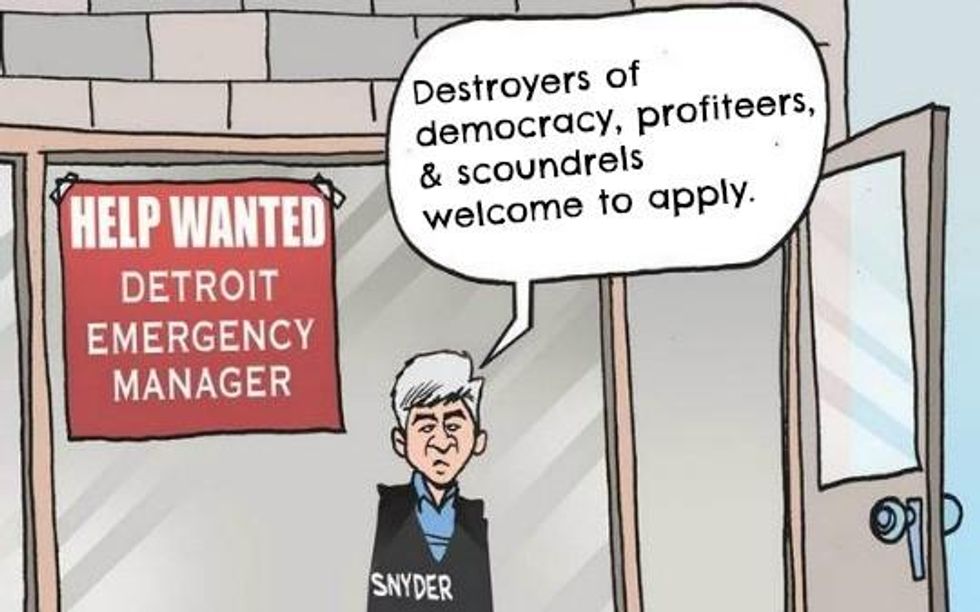The appointment of Kevyn Orr as the Emergency Manager of Detroit is a sad day for democracy. There is a growing understanding that the financial crisis justifying this move was manufactured by the withholding of state funds, the drive to protect the $474 millions paid to banks, and the desire to wrest control of the city away from its people and put it into the hands of the corporate elite. Further, we know that nowhere in the state have emergency managers solved any structural problems. Nor have they improved services. They have sold off city assets, shifted common responsibilities for public health, safety, and the general good into private hands for windfall profits. They have set aside contracts for immediate services and compacts made across generations.
Emergency managers violate the will of the people. In Detroit, the EM assumes power over the objections of the City Council and a broad array of civic leaders and organizations. The appointment has sparked widespread protest and civil disobedience that will no doubt continue as citizens seek to express their righteous anger at this assault on democratic rights. Today nearly half of all African Americans cannot vote to control their local government and 75% of African American elected officials have been removed from power. There is a rising cry for federal intervention to stop the EM.
The anguish of this moment is beyond words. It forces us to look deeply into our own history to find ways to remind one another of the kind of future we wish for ourselves and our children.
The anguish of this moment is beyond words. It forces us to look deeply into our own history to find ways to remind one another of the kind of future we wish for ourselves and our children.
For many of us this moment evokes the struggle for civil rights in Montgomery in 1955. Central to that struggle was the belief that we could create a new, Beloved Community, reflecting radical love and respect for one another.
What does radical love look like now? How do we move toward the creation of a loving community, rooted in principles of respect, dignity, and a drive to create sustainable, joyful ways of living?
Many of us have known for a long time that representative democracy would never move us toward this kind of loving community. There is too much money to be made, too many deals to be cut, and too many egos to protect. We cannot vote our way to a new future.
But we can create it. As the EM moves into the corridors of city hall, we need to deepen our relationships on the corners and sidewalks in our neighborhoods, block clubs and places of worship. We need to create opportunities to educate one another, to share ideas, strategies, and tactics for improving our daily life in the places where we live, walk, work, and pray.
We need to remember that the bus boycott grew out of a community of people that had long practiced democratic actions without any right to vote. They built churches, colleges, hospitals, schools, businesses, civic associations, and recreational centers. They developed strategies to call upon the U.S. government to live up to its highest ideals.
This history can guide us as we develop new democratic forms to create real participatory power, flowing from people making our own decisions about how we will live.
Regardless of the EM, the City Council should hold regular public meeting so citizens can openly discuss the impact of the decisions being made by the EM, share information, and strategies. The Council should follow the lead of our School Board in Exile, using such forums to insist upon transparency and accountability.
Regardless of the EM, civic organizations and places of faith should establish citizens councils to assume public responsibilities for improving neighborhood life and meeting the basic needs of people.
Regardless of the EM, citizens should organize in ways that will bring our new City Charter to life, emphasizing the creation of district leadership out of our efforts to take care of one another.
The only solution to this assault on our city is for each of us to take responsibility for recreating community life, based on respect for one another and the earth that sustains us.
In loving community, we can build a new democracy that cannot be stolen.
 The appointment of Kevyn Orr as the Emergency Manager of Detroit is a sad day for democracy. There is a growing understanding that the financial crisis justifying this move was manufactured by the withholding of state funds, the drive to protect the $474 millions paid to banks, and the desire to wrest control of the city away from its people and put it into the hands of the corporate elite.
The appointment of Kevyn Orr as the Emergency Manager of Detroit is a sad day for democracy. There is a growing understanding that the financial crisis justifying this move was manufactured by the withholding of state funds, the drive to protect the $474 millions paid to banks, and the desire to wrest control of the city away from its people and put it into the hands of the corporate elite.